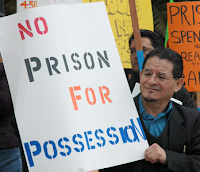In 1974, California voters passed a constitutional amendment extending voting rights to all Californians with criminal records, save for those “imprisoned or on parole for the conviction of a felony.” Prior to the amendment, disenfranchisement was permanent in CA once you were convicted of a crime. The impetus for the amendment was, hard as it may be to believe in the days of public safety rhetoric and redball crime panic, the wish to help people regain their full citizenship after they complete their parole. In a landmark 2006 case, the CA Supreme Court interpreted this provision as follows: Folks in state prison, and under state parole, can’t vote. Folks in jail or under probation (or in jail for a probation violation) aren’t considered “imprisoned” and therefore can, and do, vote.
A new piece I’m working on (coauthored with Jessica Willis) for the upcoming Loyola Constitutional Law Colloquium examines the application of this provision, and this interpretation, to a new population of offenders created by the Criminal Justice Realignment in California.
Let me present the legal dilemma. In the aftermath of Brown v. Plata, and in order to resolve the serious financial crisis faced by the state (corrections eat up about 7% of CA’s entire budget), the California Penal Code has been amended to sentence non-serious, non-violent, non-sexual offenders to do time in county jail rather than in state prison. Are these people “imprisoned” for the purpose of the constitutional provision?
Constitutional provisions that give people fundamental rights should be interpreted broadly, right? Whenever there’s ambiguity, we should support people’s right ot vote, right? Wrong. The CA Secretary of State instructs felons that, if they are among the realigned group, they cannot vote.
Several civil rights organizations, and several folks doing time in jails or on community supervision, petitioned the CA Court of Appeals for an original writ allowing them to vote (full disclosure – yours truly and coauthor Jessica Willis wrote an amicus brief on behalf of thirty criminal justice scholars in support of the petitioners). The Director of Elections for the City of San Francisco – one of the respondents – actually agreed with petitioners that they should be allowed to vote, and merely asked the Court for instructions what to do. The court threw the case in petitioners’ faces with no reasoning. Petitioners took to the CA Supreme Court, and received pretty much the same response.
In the Article I go in depth into what the Court should have weighed and considered if it took these Californian citizens’ rights seriously. But in a nutshell, here’s what I think is going on: There are two visions of Realignment. You can see it as a technical way to resolve a budgetary problem and warehouse people on someone else’s dime. Or, you can see it as a real opportunity to bring people back to their communities, through a correctional method that actually might make sense for people who will eventually come out of prison and reintegrate into society. And by throwing the case out, the Court has opted, regrettably and apparently without much thought, for the former vision. A huge opportunity has been missed. People who could, and should, have been reintegrated into society; who could’ve channeled their experiences into civic engagement; and who could’ve started to care about their communities and neighborhoods will remain isolated and alienated.
In the movie Recount, a fascinating flick about the Bush v. Gore election, a person mistaken for a felon is sitting at home, watching Bush’s acceptance speech. His face is difficult to read. Is he angry? Sad? Disillusioned? Robbed of the promise of a voice or full citizenship? When you vote in November, think about the immense number of U.S. citizens behind bars, or under supervision, from whom this right has been denied.
———–
cross-posted on PrawfsBlawg.

